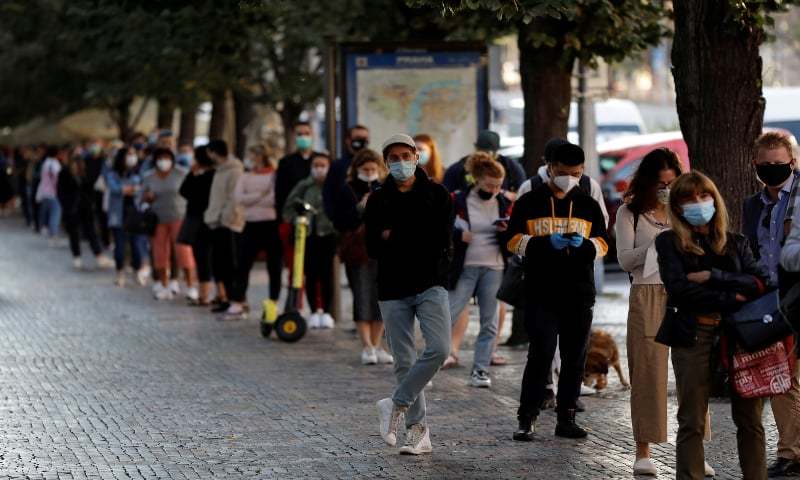The latest study by a leading blood diseases institute in Karachi suggests there is a slim chance of a second wave of the novel coronavirus in the country, further strengthening the government's policy of reopening businesses.
The cross-sectional study conducted from May to July at the National Institute of Blood Diseases (NIBD) has been published by the Oxford University Press Journal of Public Health.
Titled, “Challenges in acquiring herd immunity for Covid-19,” the study conducted by a team of microbiologists, hematologists and pathologists, led by Dr Samreen Zaidi, included nearly 1,700 people from three groups — healthcare, community and industrial workers.
It included participants from both genders, aged between 18 to 60.
The study, conducted to assess antibodies levels in a diverse group of residents to comprehend prevalence in the community, revealed that 36 per cent of Karachi's workforce — the country’s largest city and commercial capital — have already developed immunity against Covid-19.
"This study has been instigated to evaluate the seroprevalence of anti-SARS-CoV-2 antibodies in different healthcare and community population from Karachi and with the aim of assessing the importance of seroprevalence in these groups," the report reads.
The overall seroprevalence or the immunity rate, it added, is found to be 36pc with highest positivity in industrial employees (50.5pc), whereas only 13pc of healthcare workers tested positive.
Moreover, the community, which comprised healthy blood donors and walk-in patients for antibody testing, had a 34pc positivity rate.
Seroprevalence is the incidence of a disease or illness within a distinct population at one time, as measured by serology tests.
The seroprevalence rate in the US population varies from 1.9 to 6.9pc, which is very low compared to Pakistan, according to the study.
Seropositivity rates reported from Switzerland and Spain, respectively, were 10.8pc and 5pc.
Herd immunity
The study showed that around one-third of Karachi's industrial population developed immunity against Covid-19, which is still far from the 60pc to 70pc needed for herd immunity.
"In addition, if we consider acquiring 60pc of seroprevalence in next couple of months, then herd immunity is not far from reality provided the antibodies did not decline with time," the report says.
Explainer: Reaching herd immunity in a viral pandemic
"The present study raises the possibility that if 36pc of adult population of Karachi is supposed to be seropositive, then we can hypothesise that in the next 2–3 months 60pc of general population will become seropositive [immune].”
And according to Dr Samreen Zaidi, follow up studies show that the seroprevalence rate has reached 60pc, as per expectations.
"We, on the basis of a gradual drop in cases, and other relevant factors, assume that there are low chances of a second wave of coronavirus," Zaidi told Anadolu Agency.
However, she acknowledged: "Assumptions are assumptions."
"The only limitation with this study is that our sample size is small. Therefore, we have recommended a further and wide-ranging research on the government level to double check the results of this study," she says.
Endorsing Zaidi's view, Dr Tahir Shamsi, the head of NIBD, claims the country has "almost" attained herd immunity, indicating that there are low chances of a second wave of the pandemic.
"The data this study shows is until July. We are in September now, and the latest statistics, and testing results suggest that the seroprevalence or immunity rate is almost 60pc now," Shamsi, a renowned hematologist, and pioneer of plasma therapy in Pakistan, told Anadolu Agency.
The latest statistics, he says, would be published after a month.
'Virus very much there'
A similar study conducted by one of the largest laboratories in Pakistan suggested that at least 33pc of the country's health professionals have developed immunity against the virus.
The laboratory conducted tests on 15,000 health professionals across the country for the study.
The number of cases has dropped from nearly 7,000 to merely 400 plus daily cases in the past few months, with daily fatalities hovering in the single digits each day.
However, the country reported 722 new virus cases for Sept 17, following the reopening of schools earlier this week. This is the highest figure in more than a month.
The government is currently following a "mini smart lockdown" strategy. Instead of closing entire streets or shopping centers, only houses or workplaces where infections are reported will be sealed.
"Though, the latest studies, and statistics indicate less chances of a new wave of the coronavirus, there is no option of being careless. The virus is very much there. We cannot afford ignoring safety precautions, " Shamsi cautions.
"The problem with this virus is that we still do not know much about it," he adds.
Sharing a similar view, Zaidi says: "We also recommend continuing the preventive procedures and robust efforts for vaccine development."















































